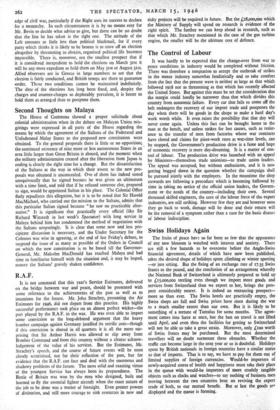R.A.F.
It is not unnatural that this year's Service Estimates, delivered on the bridge between war and peace, should be presented with some reference to the achievements of the past as well as to intentions for the future. Mr. John Strachey, presenting the Air Estimates for 1946, did not depart from this practice. His highly successful performance took place on an almost perfect wicket—the part played by the R.A.F. in the war. He was even able to impart some conviction to the long-debated argument that the heavy bomber campaign against Germany justified its terrific cost—though if this conviction is shared in all quarters it is all the more sur- prising that Sir Arthur Harris was allowed to slip away from Bomber Command and from this country without a clearer acknow- ledgement of the value of his services. But the Estimates, Mr. Strachey's speech, and the course of future events will be most closely scrutinised, not for their reflection of the past, but for evidence that the R.A.F. can face and deal with the enormous and shadowy problems of the future. The most solid and exacting virtue of the youngest Service has always been its preparedness. The Battle of Britain was won by the men who designed, built and learned to fly the essential fighter aircraft when the exact nature of the job to be done was a matter of foresight. Even greater powers of divination, and still more courage to sink resources in new and risky projects will be required in future. But the L28,000,000 which the Ministry of Supply will spend on research is evidence of the right spirit. The further we can keep ahead in research, such as that which Mr. Strachey mentioned in the case of the gas turbine engine, the smaller will be the ultimate cost of defence.


























 Previous page
Previous page